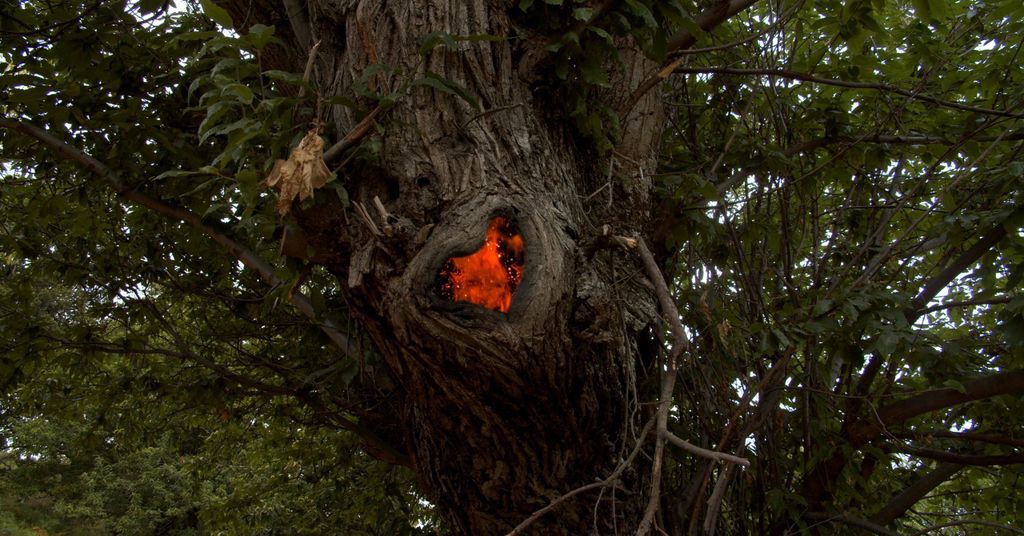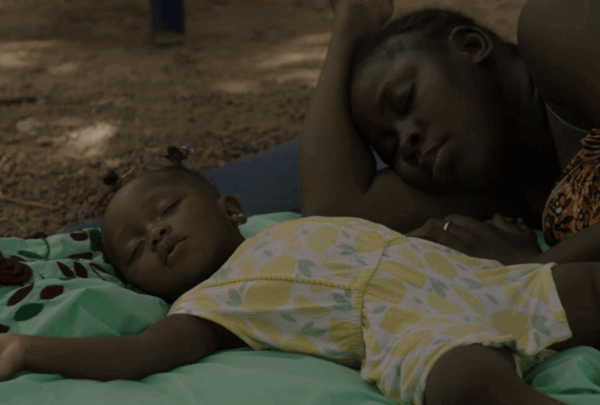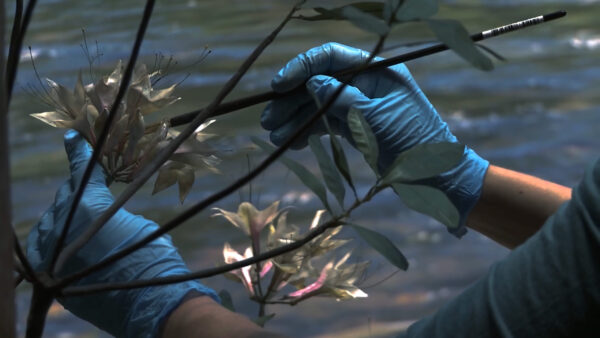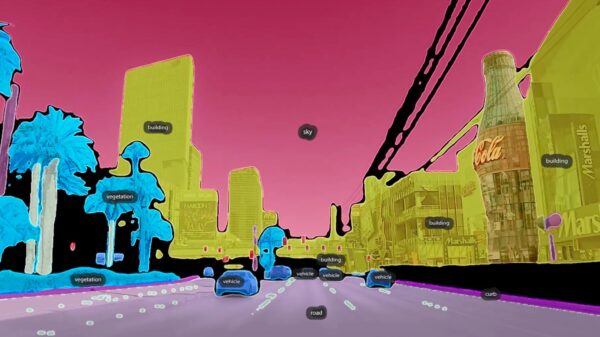Another Sunny Day
Watch The Fire Or Burn Inside It
Caroline Poggi and Jonathan Vinel’s striking visual poem proves how our capitalist way of thinking is unfit for human life and its sustainability.

Amid preparations for their next feature film Eat the Night, set to be released in 2023, the well-established arthouse duo Caroline Poggi and Jonathan Vinel are back this year with a new short film called Il faut regarder le feu où brûler dedans, translated to Watch The Fire Or Burn Inside It, which is set to have its Canadian premiere at Festival du nouveau cinéma (FNC) in Montréal, after an initial launch at Locarno Film Festival last August.
Shot as part of a residency in Corsica, Poggi’s birthplace, the film showcases the duo’s usual nihilistic hypermodernism, mainly characterised by its abundant mixed media sources. Anchored in a post-internet aesthetic both artists are familiar with, the result is a striking visual poem that assertively communicates a hypnotic—and arguably undeniable—sense of disillusion and existential turmoil. After all, a short film opening with a soft and dreamy pop song eloquently named “You Should All Be Murdered” offers little leeway on how one should interpret the filmmakers’ intentions.
Using as a backdrop the intense wildfires Corsica is sadly becoming used to endure every summer, as well as the anxiety this situation understandably generates, the film can simultaneously be seen as the manifest of a lone crusader played by Poggi herself, all the while being a testament to her will to protect, at all cost, the land she grew up on against its worst parasitic enemy: her fellow humans. While we follow her, dressed in inflammable overalls and a gallon of fuel in hand, as she scouts and documents her next targets in the dry landscape of Corsica, her voice is heard offscreen poetically reflecting on her role as an activist and the motivations behind her acts of chaos. At this point, in the face of imminent doom, political apathy, and irreparable damages to our current living conditions, what else is there to do, she argues, other than to fast-track the rate at which everything is getting burned to the ground?
“Every day, I light up fires. All over the island.” One of the very first things the voice-over deplores and raises as one of her primary incentives to burn her surroundings is also something that is becoming increasingly difficult to ignore worldwide. Whenever we talk about wildfires—or any recurrent environmental disasters, mind you—and especially when we describe their severity, we use human properties as the primary measure of destruction over other essential factors, such as the well-being of our surrounding ecosystems and wildlife. There is a chunk of hypocrisy and short-sightedness in trying to frame existential threats like global warming with such a limited consumerist scope—and that’s partially the message Poggi and Vinel are trying to convey here. But it is also another extraordinary proof of how our capitalist way of thinking is unfit for human life and its sustainability.
We’ve talked about this for so long now it’s nowhere near a surprise anymore, but the point remains. It’s mind-boggling that, despite having so many tangible threats knocking on the front door of our livelihoods (in Poggi’s case, wildfires have been witnessed in her hometown), we’re still so hardwired to consume and produce stuff, using the land and its resources to depletion, that we have yet to find a way to stop doing it correctly. With stakes this high and in such a large-scale losing fight with nature’s roaring elements, perhaps we’re meant to ask ourselves if we ever should win the war against climate change. True to their artistic roots embedded in youthful disenchantment, Poggi and Vinel suggest that not only are we not deserving of such a fight, but maybe we should even go as far as considering switching sides. As the saying goes: “If you can’t fight them, join them”.
At several moments in the film, Poggi’s character goes at length to frame herself as alien to any other humans and society as a whole. She is nameless and has no specific identity, that is, if we assume Poggi isn’t playing her own role. She is also constantly alone. She lives, eats, and sleeps in the wilderness as if she doesn’t have a home, and she moves around on foot with nothing else in her possession but her overalls, sturdy boots, and a gallon of fuel. In contrast, unafraid to shine a light on her new allegiance, she talks empathetically about the fire that is destroying her neighbourhood, implying that she communicates with it, understands it, and consoles it, all the while describing the firestorm as nothing less than “her lover”.
She also says that “in every blaze, there’s a melody” to be heard, to be listened to, like a call to action, and to that extent, several songs, some performed directly on camera, can be heard throughout the film—its heavy and diverse use of music is one of its main features. Could one deduce that each of these musical pieces is somehow the fire trying to speak to us, negotiate maybe, via a language we understand? If burning thousands of acres of habitable lands and covering a thousand more with thick black ashes is not a clear enough message for us to stop warming our atmosphere, perhaps a heavily distorted riff played on an electric guitar or a laidback, happy-go-lucky pop song claiming “I’m gonna murder all the people […] who don’t fight” might do a better job at catching our attention?
Interwoven between it all, including scenes of cars covered in fake digital flames and wildfires caught on cell phones in and around Ajaccio, lies a recurrent leitmotiv: the big bad Canadairs. These yellow ‘water bombers’ are a common sight for those familiar with firefights. The planes are designed to land on lakes and rivers, swallow thousands of gallons of water into their belly, and then fly back and dump it on the fire. They constitute a highly-praised engineering miracle and a symbol of humanity’s fortitude against incredible challenges. Yet, they hold an interestingly ambiguous role in the film’s narrative. Since Poggi and Vinel’s point is to amplify the fire’s voice in a battle we’ve rarely witnessed outside of our human perspective, these planes should be considered a threat with a capital T: they represent the spearhead of the fire’s enemy. Surprisingly, though, it is not how they’re portrayed here. Introduced to the audience via a dream the voice-over is recalling, the Canadairs are depicted in an eerily neutral way, neither morally good nor bad, but rather trustworthy witnesses, as if they, too, understood the fire and saw eye to eye with it, despite their opposite allegiances. It takes a soldier to know another.
“Will there ever be a world I don’t want to watch burn?” In the aforementioned dream Poggi describes, she mentions swimming on a lake, getting swallowed by an incoming Canadair, and then being dropped in the middle of the flames, feeling happy and at peace, lying amongst the burning trees with broken legs. Directly referencing the film’s title, this dream also suggests a choice to be made; whatever that is, we can’t afford ambivalence anymore. With this new visual poem, Poggi and Vinel have made their decision very clearly, but they were also smart enough to let the audience pick their own side, while reminding them to at least do it knowingly and assertively. Whether we’re willing to fight and make actual tremendous changes to our way of tackling greenhouse gas emissions or whether we want to keep living unsustainably like the zombies we are right now, then at least we better stop hiding behind half-hearted values and double down. It’s a bold and incautious claim—nothing too surprising given the duo’s track record so far—reminiscent of a battle cry meant to rally the troops and, perhaps, also to rattle, one last time, a cage we are getting dangerously desensitised to.





There are no comments yet, be the first!